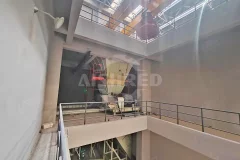
Imagine a single grab of textile waste weighing over a ton being effortlessly fed into a powerful shredder. Within moments, the machine processes the load, shredding various types of textiles—old clothes, industrial fabrics, and mixed fibers—into uniform pieces perfectly sized for use as power plant fuel. This is the unmatched performance of our heavy-duty textile shredder, now available for sale in Europe.Performance HighlightsDesigned for industrial-scale textile shredding, this shredder can handle more than 20 tons of material per hour. With its robust double-shaft design, it ensures smooth and efficient shredding, no matter the material type. Whether it's tough industrial textiles, soft fabrics, or mixed materials with threads and linings, this machine consistently delivers high-capacity output with minimal downtime.Watch It in ActionTo truly appreciate the capabilities of this shredder, we’ve prepared a demonstration video showcasing its performance. Watch as the machine effortlessly processes over a
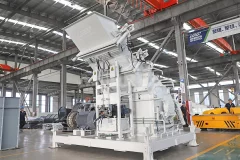
A cement plant in Mexico is in need of textile cutting equipment to process air bags, which are primarily made from nylon and hard plastic-fabric. The required equipment with a processing capacity of 1 to 2 tons per hour (TPH) and an output size of less than 30mm.At GEP ECOTECH, we specialize in providing efficient and tailored solutions for challenging material processing needs. After reviewing the requirements, we would like to recommend our GSS15 Single-Shaft Shredder as the optimal solution for your air bag processing needs.Why Choose the GSS15 Single-Shaft Shredder?High Torque and Durability:The GSS15 is equipped with a high-torque motor that provides the necessary power to shred tough, dense materials like air bags. The high-torque operation ensures that the shredder effectively cuts through the tough nylon and plastic layers without causing jams or excessive wear.Adjustable Output Size:The GSS15 comes with adjustable cutting blades, allowing you to achieve the desired particle size of
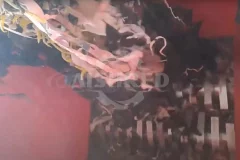
Disposal of waste fabrics is a crucial task in the modern industrial and environmental fields. With the booming development of various industries, the amount of waste fabrics is increasing. How to effectively deal with these waste fabrics has become a key concern for many enterprises and environmental protection departments. As an efficient processing equipment, fabric shredder has gradually gained wide application with its unique working principle and outstanding performance. Application areas of fabric shredder1.Textile industryIn the textile industry, fabric shredder is mainly used to deal with waste fabrics, textile trimmings and old clothes, etc. These materials can be used as raw materials for regenerative fibers for the production of new textiles after shredding, which greatly improves the utilization rate of resources and promotes the development of resource utilization. 2.Garment manufacturingClothing manufacturing process produces a large number of trimmings and defective products, how to deal with
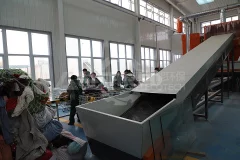
Textile Trimmings Fabric Shredder
2024-11-07Clothes, broken sheets, waste cloth, these originally to be landfilled or incineration for the fate of the textile trimmings, with the fabric shredder, but has a different “destiny”.Fabric shredders are a common type of industrial equipment used to shred various types of fabrics and textiles into small pieces for subsequent processing. They are commonly used in textile mills, garment factories, recycling plants and other places where large quantities of fabrics need to be processed. The AI SHRED SHREDDER is a machine designed to handle a wide range of hard leather and leather bags, soft, fibrous wastes, and has demonstrated excellent performance in handling textile wastes in particular. It drives the rotor of the movable knife to rotate at a low speed by driving the knife shaft by the power system, and the textiles such as waste clothes, fabrics, carpets and other textiles are quickly shredded into small pieces through mutual tearing and shearing between the knives, and even the degree of fine shredding can

GEP's single-shaft textile shredder is an ideal solution for textile recycling in the USA, providing high-quality shredding with adjustable discharge size, robust construction, and a long service life. Designed for various textile waste materials, this shredder is suitable for industries and facilities focused on efficient and sustainable waste processing.Features of the GEP's Single-Shaft Textile Shredder The single-shaft textile shredder is an upgraded model that employs a "double motor + double reducer" drive system, offering a powerful shearing force and high shredding output. This design is especially useful for efficiently processing dense and resilient textile materials, making it a versatile choice for diverse applications in the textile recycling industry.Complete Textile Recycling Solution The textile shredding system is equipped with:Single-Shaft Shredder: Provides efficient shredding with customizable output sizes, typically reducing textile waste to around 3 cm.Belt Conveyor: Automates the
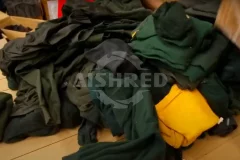
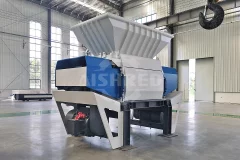
Efficiently disposing of old uniforms is crucial for maintaining security and confidentiality in many organizations. GEP Ecotech’s GSD series high-speed shredders offer a robust solution for the effective destruction of uniforms, ensuring quick and thorough processing while promoting sustainability.Features of GEP Ecotech's GSD Series High-Speed ShreddersThe GSD series shredders are specifically designed to handle the challenges associated with shredding fabric materials like uniforms. Key features include:High-Speed Operation: Capable of shredding large volumes of uniforms quickly, enhancing operational efficiency.Robust Blades: Equipped with strong, durable blades that can efficiently cut through tough fabric materials.Automated Controls: User-friendly interfaces for easy operation, monitoring, and control, ensuring consistent performance.Durable Construction: Built with high-quality materials to withstand continuous operation and minimize maintenance needs.Safety Features: Includes safety interlocks,
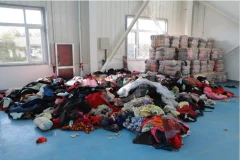
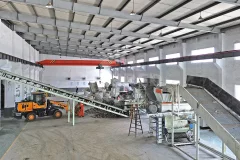
Waste fabrics, textiles, clothing, leather trimmings and shoe offcuts contain certain organic and fiber-based substances with high calorific value. Therefore, these wastes can be reused as fuel raw materials by means of centralized treatment after shredding of waste cloth. Usually, the process of handling these waste textiles includes sorting, loading, shredding, secondary shredding, uniform fabric in silo, compression molding and preparation of discharges. Among them, the classification is to separate different types of waste textiles for subsequent processing; the loading is to feed the classified waste textiles into the production line; the shredding is to cut the waste textiles into smaller fragments so as to better carry out subsequent processing; the secondary shredding is to further reduce the size of the fragments so as to make them easier to be compressed and molded; the bin uniform cloth is to ensure that the fragments are uniformly distributed in the compression molding process so as to ensure the

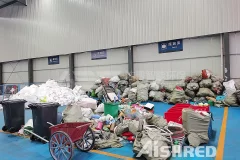
The efficient processing of flexible materials holds significant importance in various industries such as packaging, recycling, and manufacturing. Single-shaft shredders have emerged as a reliable solution for effectively reducing the size of these materials. This article aims to explore the optimization techniques of a single-shaft shredder for handling flexible materials, addressing their unique challenges and proposing strategies for improved performance.Understanding Flexible MaterialsFlexible materials encompass a wide range of products, including plastic films, foils, textiles, and rubber products. Their distinctive properties, such as low density, pliability, and elongation, pose challenges during shredding. It is crucial to determine the material’s specific attributes, including thickness, stretchability, and composition, to optimize shredding parameters. Shredder Design OptimizationCutting Rotor Design:Careful consideration must be given to the selection and configuration of cutting rotors. The
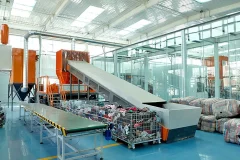
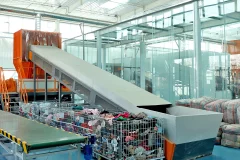
Textile Waste Processing
2022-03-03Waste, trimmings and discarded textiles, clothing and leather from the textile and garment industry are solid wastes that are as difficult to degrade as plastics. Simple piles or landfills not only take up space but also pollute the environment and cause waste. Using proven systems for shredding these materials, these wastes can be recycled for fibre or processed into boiler fuel for power/heat generation.GEP ECOTECH has a proven solution for shredding waste textiles, using industrial grade twin shaft shredders that efficiently shred objects into small pieces for easy subsequent processing, even heavy carpets are easily handled with shredders using GEP ECOTECH technology.For most small applications, the use of one GEP ECOTECH shredder + loading belt is sufficient, simple and reliable.GEP ECOTECH offers a range of scrap textile shredding machines from small to very large sizes, with capacities ranging from a few tens of kilograms per hour to over ten tons per hour.


